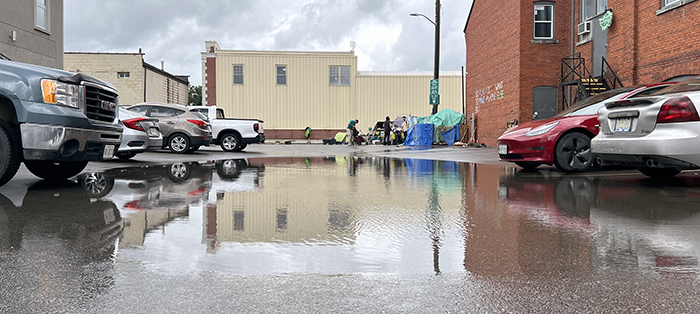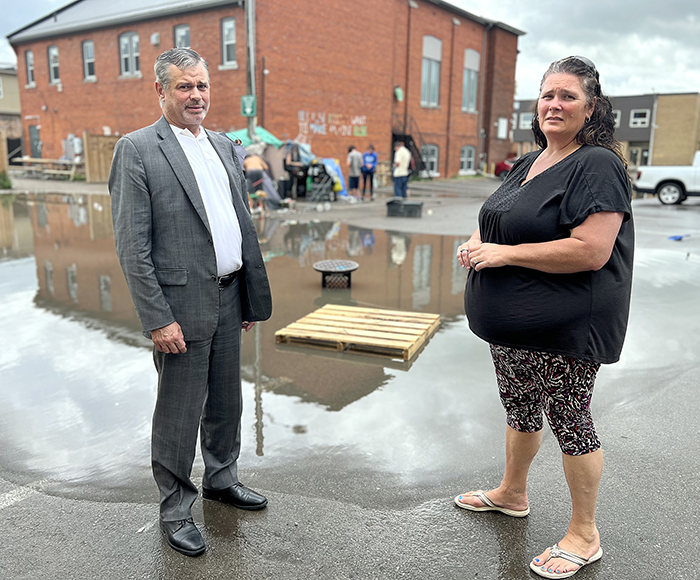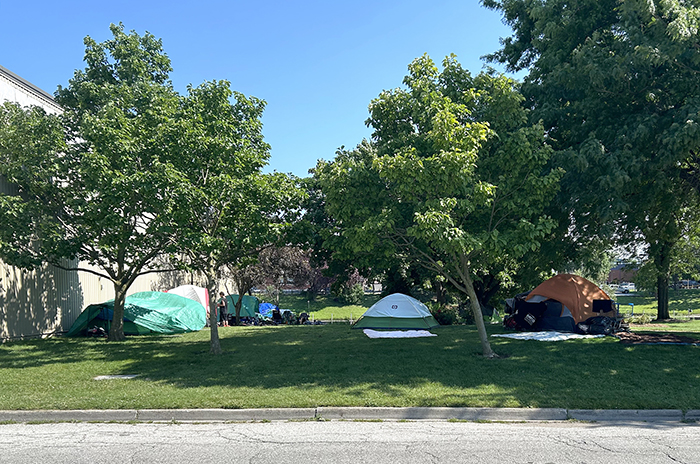
By Pam Wright
Local Journalism Initiative Reporter
It looks like last week’s torrential rains have washed away an impromptu homeless encampment in Chatham’s downtown.
And while it’s welcome news for downtown Chatham business owners, those providing outreach are worried the homeless won’t be able to access the services they need.
A faulty catch basin has been blamed for flooding at Municipal Parking Lot # 9 on Wellington Street. As a result, the 40 or so people living there in 10 tents have moved on. As of July 12, the lot was clean and empty.

However, Loree Bailey, general manager of Hope Haven, located just mere steps away from the parking lot, said she’s concerned about the welfare of the homeless people that were living in the parking lot. Staff saw them on a daily basis when the centre is open from 10 a.m. to 2 p.m.
“At least when they were here, we could check on them,” Bailey said. “The reality is they need a certain level of support.”
According to Bailey, substance abuse and mental health problems plagued many in the encampment, noting staff administered naloxone nine times in a single week in response to opioid overdoses.
But Bailey is quick to point out that not everyone who comes to the faith-based outreach for help is homeless.
“Some of the people have places to live and jobs, but they just can’t afford food,” Bailey explained. “Some of them come just to get a sandwich.”
Chatham-Kent Legal Clinic housing stability worker Jeff Wilkins said the issue of homeless encampments, particularly in downtown areas, is a thorny one.
While far from ideal, Wilkins said the Wellington Street tent village was close to Hope Haven, allowing those in need to access a computer, get something to eat, grab a shower, use the toilet or perhaps meet with a worker.
“They need the resources,” Wilkins stressed.
While encampments might be okay in warm weather, Wilkins pointed out when winter arrives, transient encampments won’t be safe.
“Chatham-Kent is going to have to find a more permanent solution,” he said.
The municipality is working on it. According to communications manager Eric Labadie, C-K is examining the way other municipalities are dealing with homelessness and developing “more detailed policy and guidelines to address encampments.
“We are communicating with other municipalities that are experiencing similar issues to assist in determining best practices, next steps and interim solutions while new housing is being built,” Labadie said.
The issue continues to be a top priority, he said, noting various staff and community stakeholders are working together “towards solutions to these very complex issues.”
Andrew Thiel, Abstract Marketing president and Historic Downtown Chatham BIA board co-chair, hopes a solution can be found.
While he agrees it’s a shame people are driven to live in encampments, existing beside the one at Hope Haven has been “incredibly stressful” for business owners and residents.
Thiel said the situation got worse day by day, with tents taking up parking spaces and sketchy behaviour of some of the tenters scaring people away from the downtown.
Business owners have invested heavily, he added, and they didn’t want to lay off staff or close.
“The lot was simply unsafe,” Thiel said, noting business owners and residents have been yelled at, threatened and had their property vandalized.
Active addiction was a problem, he said.
“Last month there were three overdoses in one day, there were constant physical assaults and a plethora of illegal activities running around the clock,” he said.
The lack of sanitation, dirty needles and other biohazards added to the problem.
After observing the encampment closely for a period of time, Thiel said it’s changed the way he and others view encampments.
“The narrative has to change from thinking that just looking away is all right,” he said. “We need to do something. Looking the other way does not encourage them to seek counselling or get the help they need; it enables them to continue a lifestyle of harming themselves and those around them.”
Part of the encampment has relocated to Rotary Park on the north side of the Thames River near the Third Street Bridge.






